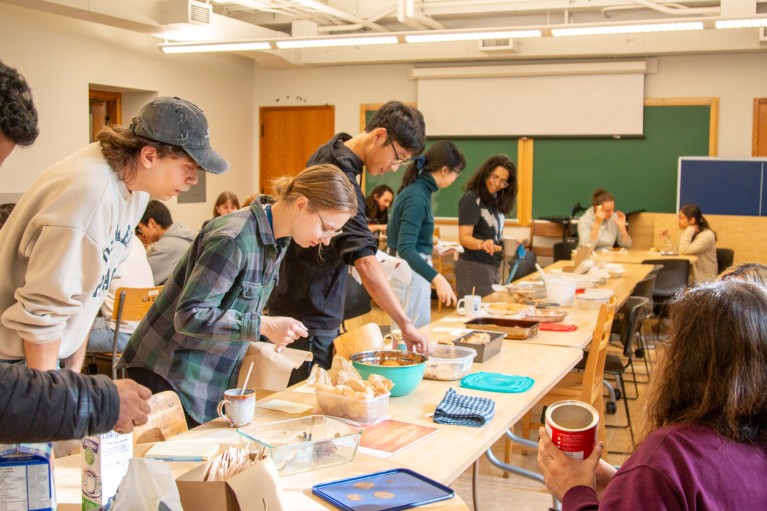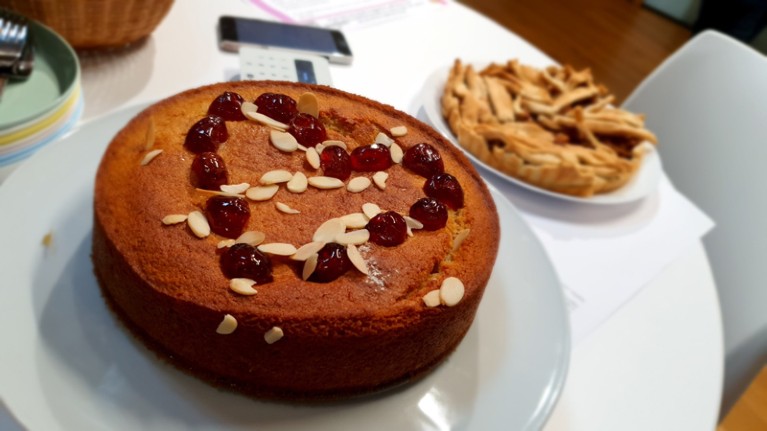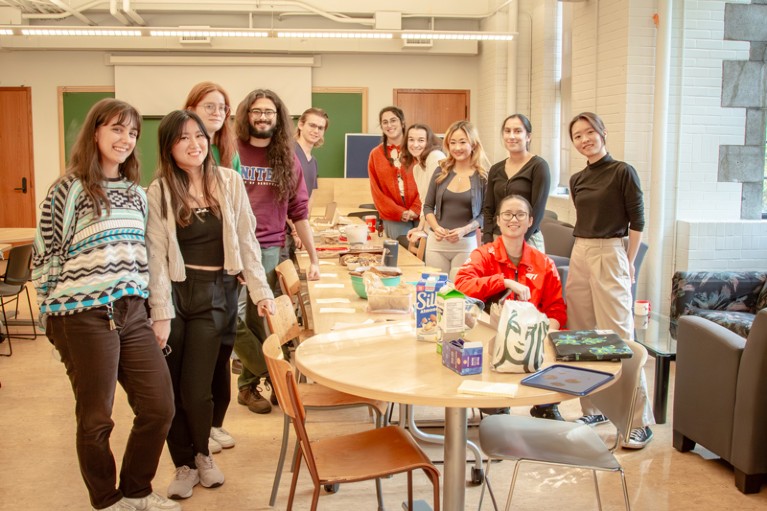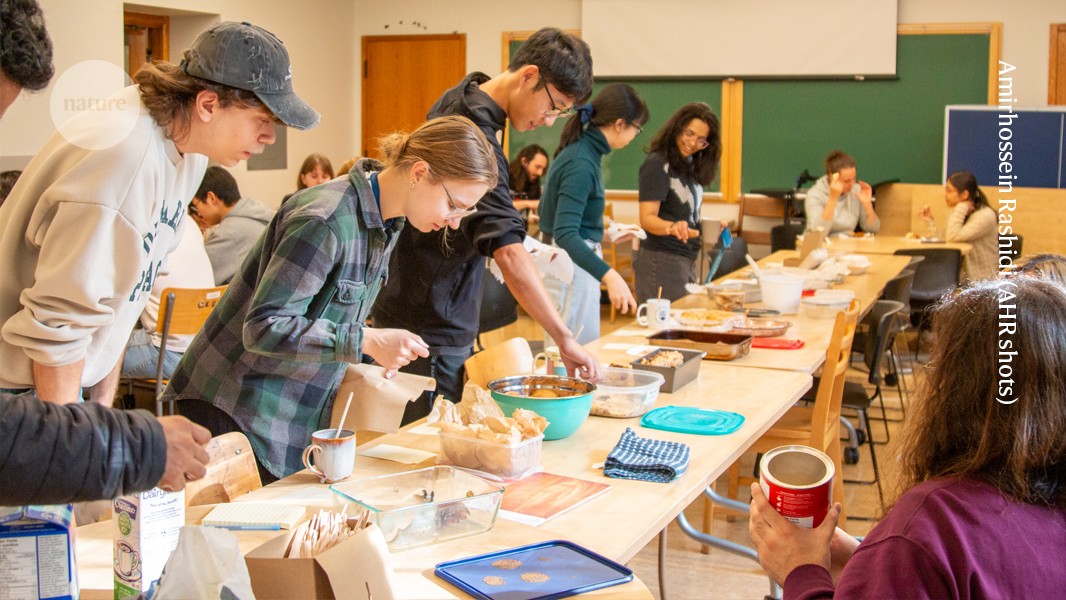
A bake sale at the University of British Columbia. Credit: Amirhossein Rashidi (AHR shots)
When the National Astronomy Meeting, organized by the UK Royal Astronomical Society, descended on Durham University in July, Martina Veresvarska saw the gathering as an opportunity not just to talk shop, but also to indulge her baking hobby. The annual conference, usually held in the British Isles, is one of the largest of its kind in Europe.
Veresvarska is a PhD candidate at the UK university’s Centre for Extragalactic Astronomy and a co-founder of the astronomy department’s charity bake-sale organization, Cakes for Good. At this year’s conference, Veresvarska and fellow astronomy PhD student Ciera Sargent ran their largest bake sale so far, helped by ten volunteer bakers from the department. During an organized coffee break at the meeting, the team catered for nearly 1,000 attendees and raised roughly £450 (a little over US$600) in just 30 minutes for the Great North Air Ambulance Service.
Cakes for Good is just one example of scientists coming together not only to foster community in their own departments, but also to raise money for charitable causes. For some, these efforts represent a small but powerful way to make a difference in their communities when their busy schedules or financial situations might otherwise prevent it.
Building community
Veresvarska arrived at Durham as a new PhD student in September 2021, amid the COVID-19 pandemic. Making connections with other students or faculty members proved difficult, even after lockdowns began to lift and the world started to open up again, she says.
To help rebuild a sense of community in the department, Veresvarska and her co-founders started Cakes for Good in April 2022. Instead of baking for the department and accepting money to cover the cost of ingredients, as had been done in the past, the Cakes for Good team decided to donate any money raised to charity.
“We thought that letting others [in the department] decide what charities this should go to might be a good way to get people involved and interested,” Veresvarska says.
Cakes for Good ran its first charity bake sale in May 2022 to support humanitarian aid in Ukraine. Since then, it has run monthly bake sales throughout the academic year to support global causes such as Medical Aid for Palestinians and support for schoolgirls in rural Kenya. It has also donated money from the sales to local charities supporting transgender youth, refugees and asylum seekers and environmental conservation. Each sale earns about £180–200, and Cakes for Good has raised roughly £4,555 for charity since 2022.

Cakes for Good bake sales organized by astronomers at Durham University, UK, have raised thousands of pounds for range of charities.Credit: Cakes for Good
Anything chocolate is usually a big seller, Veresvarska says. The only complaint has been that some of the baked goods are just too good, she jokes, adding: “I had someone tell me in January that it’s unfair that we hold the bake sale outside their door, because they’re on a diet.”
Working to develop community is also at the heart of a biannual bake sale run by the Chemistry Graduate Students Society (CGSS) at the University of Waterloo in Ontario, Canada, in collaboration with undergraduate chemistry clubs. Its first bake sale, in 2023, raised funds during Pride Month for a local organization, Spectrum, that offers a gathering place, as well as mental-health resources, for the LGBTQ+ community.
Of the society’s two bake sales each year, the first raises funds for Spectrum, the second for another local charity, such as the Women’s Crisis Services of Waterloo Region. The organizers say that, at each event, they raise roughly Can$500–800 (US$360–580). Cookies — chocolate chip, matcha or snickerdoodle, which are rolled with cinnamon and sugar before baking — are usually a big hit (see ‘University of Waterloo’s idiot-proof cookies for scientists’), along with loaf cakes such as banana bread, says Madison Donohoe, a PhD student and co-president of the CGSS.
At the University of British Columbia (UBC) in Vancouver, Canada, the CGSS runs a charity bake sale three times a year. For an entrance fee of just Can$2, staff, faculty members and students in the department can take as many baked goods as they like, usually from a selection of up to ten options.
Lucas Andrew, a chemistry PhD student and CGSS president at the UBC, says that queues often form about 20 minutes before the charity bakes appear. Recent treats have included matcha cheesecake and butter mochi, a cake made with coconut milk and glutinous rice flour that originated in Hawaii. At each event, the group raises Can$100–200 for local charities. Among these are the PHS Community Services Society, which provides housing and health-care services to vulnerable people in Vancouver, and RAVEN, which supports local Indigenous communities.

Chemistry graduates at the University of British Columbia in Canada run charity bake sales three times a year.Credit: Amirhossein Rashidi (AHR shots)
“As grad students, we don’t generally have a lot of disposable income,” Andrew says. “You may not be able to often donate on your own to a charity, but the fact that we can come together as this community and contribute to these local initiatives is really, really nice.”
Tips for success
If you’d like to start your own charity bake sale, these bakers have some words of wisdom to share.
Go where the people are. Attract customers by hosting bake sales at busy times and locations. For the University of Waterloo’s bake sale, this means between 11 a.m. and 2 p.m. in the atrium of the Science Teaching Complex, where a lot of hungry students will be on a break from class, says Emily Wedde, co-president of the CGSS.


